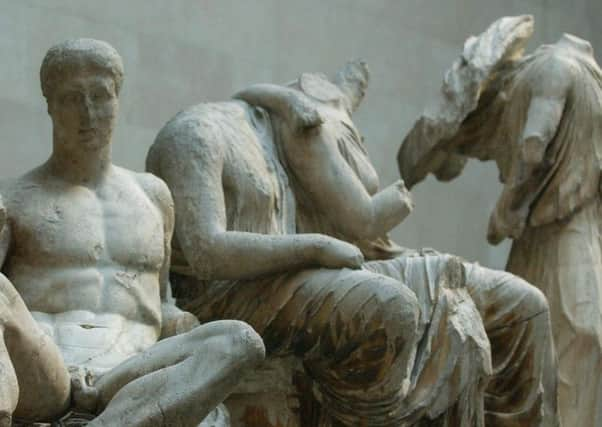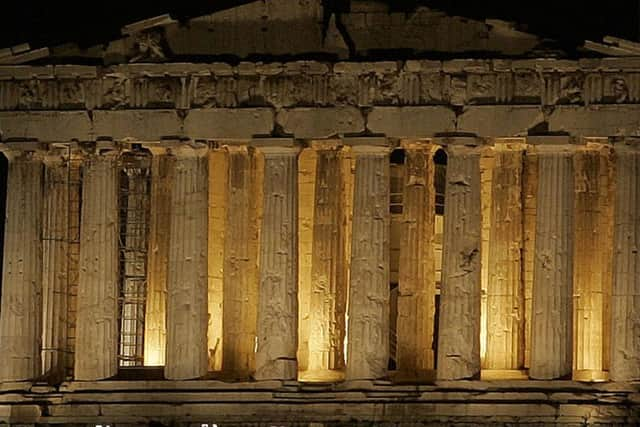How Brexit could help right a historic wrong of epic proportions – Ian Johnston


What is the greatest work of art of all time? When trying to answer this question, I think there are three key factors: aesthetics, meaning and longevity.
In my view, there is really only one candidate. It has stood the test of time since the dawn of recorded history. It was copied by the artists of the Renaissance and also by the great powers of later centuries when they wished to display grandeur. And it was created in celebration of something vitally important – the victory of democracy over tyranny.
Advertisement
Hide AdAdvertisement
Hide AdThe Parthenon in Athens – the building, with its beautifully fluted columns that can be seen all over the world from the US Capitol in Washington to the British Museum in London, and its utterly astonishing sculptures of the most life-like stone figures – simply has no rival.


However, as many will know, its sculptures are not whole. About half are in the British Museum, where they were once known, ludicrously, as the Elgin Marbles, after the Scottish aristocrat who took them from Athens more than 200 years ago. That’s a bit like renaming Michelangelo’s David after a wealthy business tycoon who somehow managed to acquire it. For the record, it was ordered built by the Athenian general Pericles and the actual work, which began in 447BC, was led by the sculptor Phidias.
About half the sculptures are still in Athens, where they are beautifully displayed within sight of the Parthenon in the Acropolis Museum, but there are also smaller pieces scattered around half a dozen museums in Europe.
Ancient Greeks would understand
Polls show a sizable majority of British people – by two-to-one or more – support helping the restoration of this most precious piece of art by returning the London sculptures to Athens but, understandably, it’s not high on the agenda of many voters and, therefore, politicians. Given they were fellow democrats, the ancient Athenians would probably understand.
And if they seem rather distant, then look at the faces of the figures on the frieze because it is possible that these are representations of actual people – the 192 Athenians killed at the Battle of Marathon, a victory over an invading Persian army that saved the city’s democracy.
However, Brexit has created a situation in which the interests of Boris Johnson’s government are aligned with those who value the Parthenon as a symbol of democracy, as a work of art or both.
The UK’s impending divorce from the European Union has already created some bad blood and there is a real risk that relations could deteriorate further despite considerable goodwill of sensible people in both camps.
Returning the “Elgin Marbles” would be a disarming and unexpected gesture, a parting gift of huge significance. The British tabloids would ridicule the idea, with the predictable and unthinking joke about Johnson “losing his marbles”. So it might take the likes of Johnson’s oft-maligned aide Dominic Cummings, as a fan of the wisdom of “weirdos and misfits”, to see that it makes sense in a perhaps unconventional way.
Advertisement
Hide AdAdvertisement
Hide AdIt would create significant goodwill towards the UK and not just in Greece. Returning the sculptures to Athens would spark national celebrations in a country that has suffered far more than the UK following the 2008 financial crash and which has struggled to cope with the exodus of refugees fleeing the war in Syria.
Restoration, rather than 'return'
Greece already has some British heroes, like the poet Byron, who fought for Greek independence from the Ottoman empire in the 1800s, and Edward Codrington, the British admiral who destroyed an Ottoman and Egyptian fleet in the key Battle of Navarino in 1827. Johnson’s name could be added to the list.
There is considerable bad feeling in Greece towards the EU after Brussels insisted on swingeing austerity in return for vast bailout payments following the 2008 crash. But, if the EU was seen as assisting in the reunification of the Parthenon sculptures, it would help Brussels restore much of its lost reputation.
None of the arguments against reunification stand scrutiny. Some claim it would set a precedent that would clear almost every museum in the world. It’s not a precedent, museums have returned items on a case-by-case basis without causing any kind of flood.
And this is also not the same as returning the Stone of Destiny, a single thing, to Scotland because that’s where it was made. Instead the “Elgin Marbles” are large and important fragments of an extraordinary whole that should be put back together.
This should happen for the sake of democracy and art but now also because of the vital need for Brexit Britain to preserve good relations with the ideological descendants of the ancient Athenians, the democracies of Europe.
